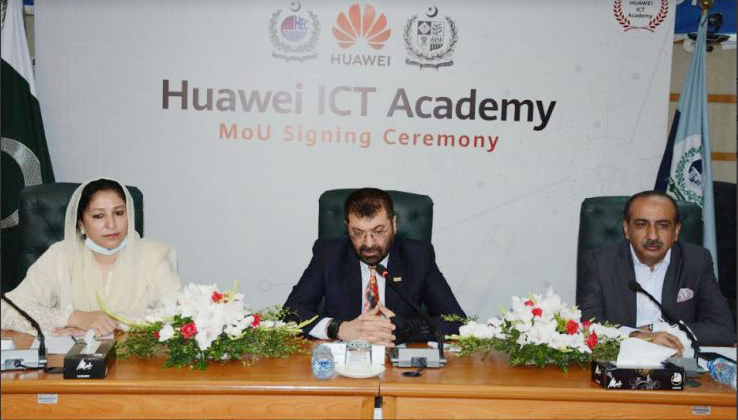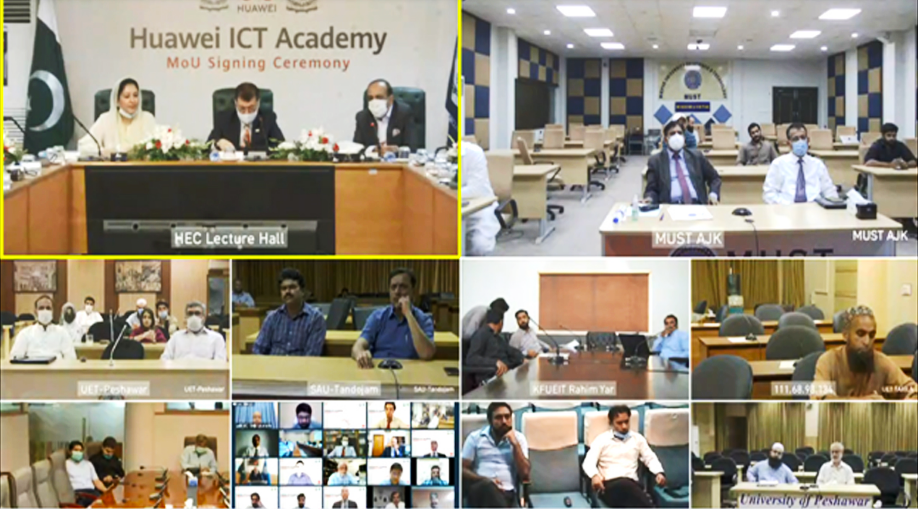Other Universities to follow UET, says chairman higher education commission Dr. Tariq Banuri while speaking at the MOU signing ceremony between higher education commission Pakistan (HEC) and Huawei technologies Pakistan.

MOU signing ceremony held at HEC Islamabad, where large number of attendees participated virtually through video conferencing. Under the MoU, Huawei ICT Academies will be established in eight new universities, which will join existing 15 academies by the end of 2020, bringing the total number of universities to 23. In addition, the Training Academies in 5 of the existing universities will be upgraded. HEC Chairman Tariq Banuri was the chief guest at the virtual signing ceremony.
The event was also attended by Parliamentary Secretary for Federal Ministry of Education and Professional Training Wajiha Aram, Executive Director HEC Dr. Fateh Marri, Vice President, Public Affairs and Communications, Huawei Middle East Li Xiangyu (Spacelee), and a large number of Vice Chancellors.
Addressing the ceremony, chairman HEC appreciated UET for its tremendous efforts in capitalizing the opportunity in terms of the training program, mobilizing revenues and creating a chord of people who could then provide training to others. Dr. Tariq Banuri wished to see other universities specially the new ones replicating the experiences of UET.
The incumbent chairman explained how HEC is working on different programs for the universities so as to make technical learning a central and essential part of the learning provided to the students. He unleashed his vision to see graduates from universities not only
being capable of knowing the subjects in which they are trained but also being able to go out practically creating their own businesses, operating more effectively as well as being successful in their jobs and employment. Addressing the vice chancellors, chairman HEC advised them to take a personal interest in leveraging the opportunity both for students and faculty and also take it as a way of transforming universities by harnessing technology in the operations of the university. He also urged them to develop collaborations with other universities and use this to create a broad community of people with the requisite skills to bring about the necessary transformation needed in the country.
Dr. Tariq Banuri congratulated the new inductees of the program, wished them luck and paid special homage to UET for its exceptional work being done.
He also congratulated other 13 universities that were part of this initiative and contributed significantly. He was of the strong view that other universities must put in special efforts if they are to rise above UET’s example. In the end he specially thanked his partners from Huawei and promised his full support in working together to not only bring about transformation in Pakistan but also to add further strength to the long standing and happy relationship with China.
The Huawei ICT Academy Program is a global initiative aimed at promotion of ICT technology skills. The program was launched by HEC and Huawei in 2017. It features industry-academia linkages and cooperation with universities in different countries for development, training and certification. It is based on Huawei’s advanced technologies in the ICT area and leading market solutions. Twenty-six universities submitted their proposals to the HEC for joining the program. Following an open and competitive selection process, eight universities were chosen to host the next set of ICT Academies. These are Mirpur University of Science and Technology, University of Central Punjab, Muhammad Nawaz Sharif Agricultural University, Khawaja Fareed UET, Usman Institute of Technology, Sindh
Madressatul Islam University, UET Peshawar and the University of Peshawar. The five existing academies which will be upgraded, based on their past performance, are COMSATS University Islamabad, NUST, UET, NED University of Engineering and Technology, and Ghulam Ishaq Khan Institute (GIKI).
